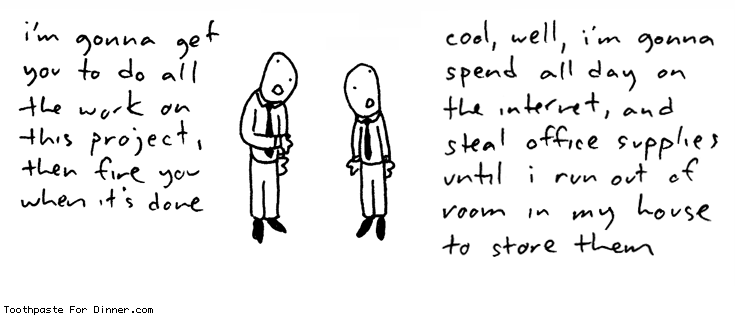 ...I dislike that phrase. "To be honest," is something my roommate says, but he isn't emphasizing the truthfulness of his next statement--it's just something he says. An appropriate usage of the phrase does not distinguish itself from an inappropriate usage thorugh grammar--both could be grammatically correct, and could refer to a subject whose veracity is in question--but rather its use or overuse.
...I dislike that phrase. "To be honest," is something my roommate says, but he isn't emphasizing the truthfulness of his next statement--it's just something he says. An appropriate usage of the phrase does not distinguish itself from an inappropriate usage thorugh grammar--both could be grammatically correct, and could refer to a subject whose veracity is in question--but rather its use or overuse.Honesty itself seems to be overrated and underused. Or at least misused. Blunt and utter honesty is socially unacceptable (A: "Good morning!" B: "You look like shit. Rough night?"), unless among very close friends. (Stereo)typical female behavior and baited questions such as "does this dress make me look fat?" are not requesting an honest answer, at least not from a man. A question such as "do you still love me?" or "am I your best friend?" are phrased so as to suborn honesty to what the questioner wants to hear. Still, most people consider trust to be the basis of any relationship, platonic or romantic, and breaches of that trust are, in some people, unforgivable.
But how can we demand honesty from others when we are often dishonest with ourselves? Sometimes it is a deliberate deception ("just one cookie won't make a difference" or "I'm only going to do XXX this once") as a justification for improper behavior; this self-rationalizing is necessary to remain some semblance of self-respect following the myriad of inevitable small flaws in our resolve. Sometimes, though, this self-deception is deeper and can run to outright denial, usually in proportion to the issue at hand. Accepting that you have a problem, an addiction, or that someone doesn't love you any more is more difficult than a simple rationalization, and is for some people impossible. I'd like to think it's a matter of perspective, but I also believe a strong measure of introspection can determine our likelihood of self-denial.

(Honesty in the Workplace)
So to be honest, I sometimes have problems being honest with myself--my real motives, my real ambitions and thoughts, hopes and dreams, problems and flaws--are harder to accept than a superficial explanation, and I won't pretend I don't take refuge in self-delusion to balm emotional wounds. But in the end, just as is true in any relationship, I have to live with myself--no closer relationship exists--and must therefore be honest with myself. And to be honest, sometimes I'm not sure what that means.



3 comments:
First, http://despair.com/indem.html.
Second, go read _Lust in Translation_. I think you'll be intrigued.
-Mason
Well, socially, if we're brutally honest, we get shut off and the message gets lost - that's why asian societies like the Japanese prize the context and want to smooth the antagonism over so that a dialog still exists, thus points can still be made.
With yourself, it's sort of another matter, in that recognizing that you're doing something and trying to fool yourself can either be a self-correcting issue, in which you demonstrate your discipline, or you do things that you fail to correct because you have not the discipline, or because the pathology is co-dependence and you want someone else to tell you to stop. That's a different motivation.
In the end, I think that, as a carryover from the "old days" that doing things that take or teach self discipline, and encourages you to be truthful with yourself are always beneficial in the long run.
Jagmkix
This above all: to thine own self be true, And it must follow, as the night the day, Thou canst not then be false to any man.
Thank you, Shakespeare.
mom
Post a Comment